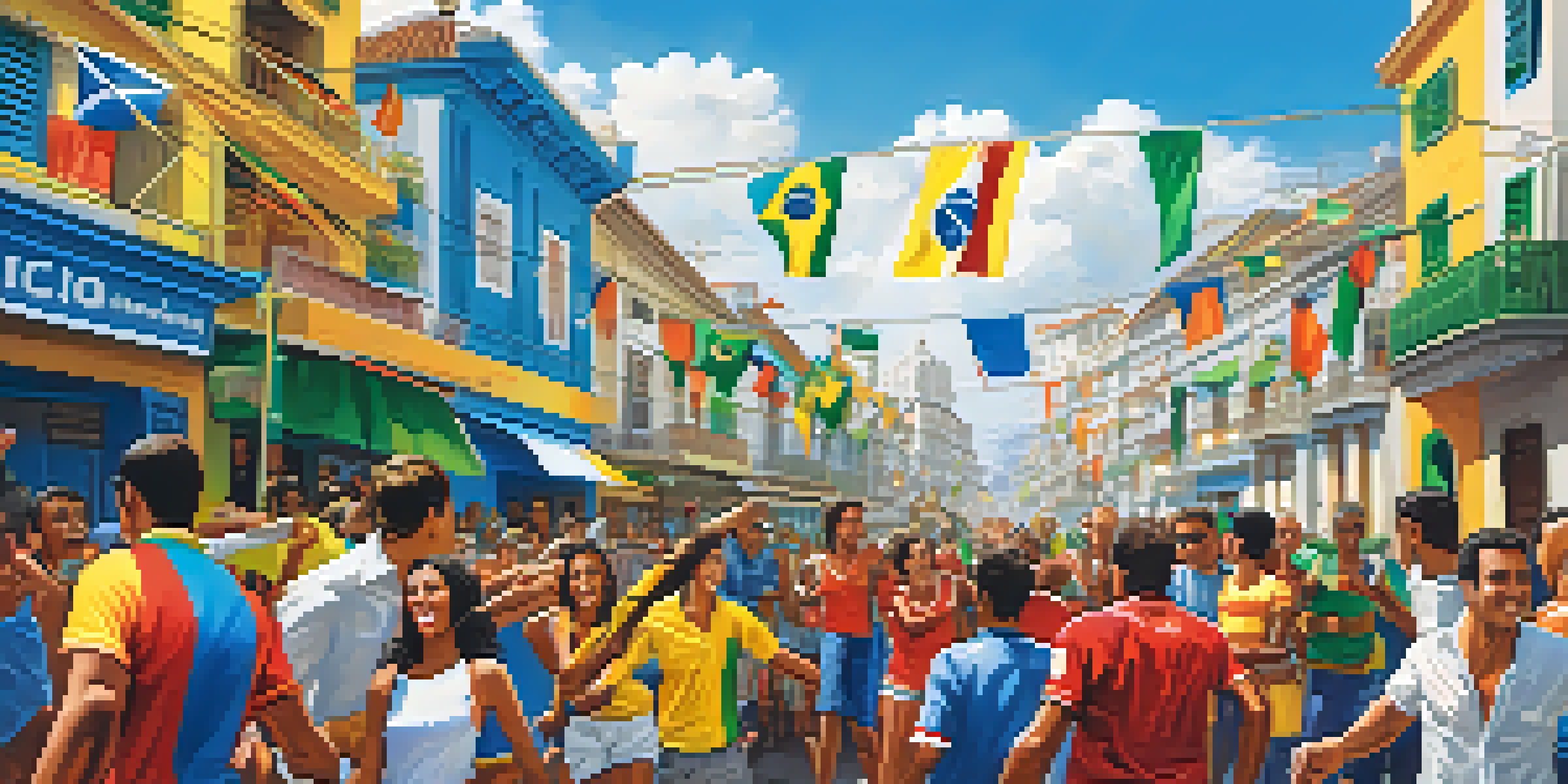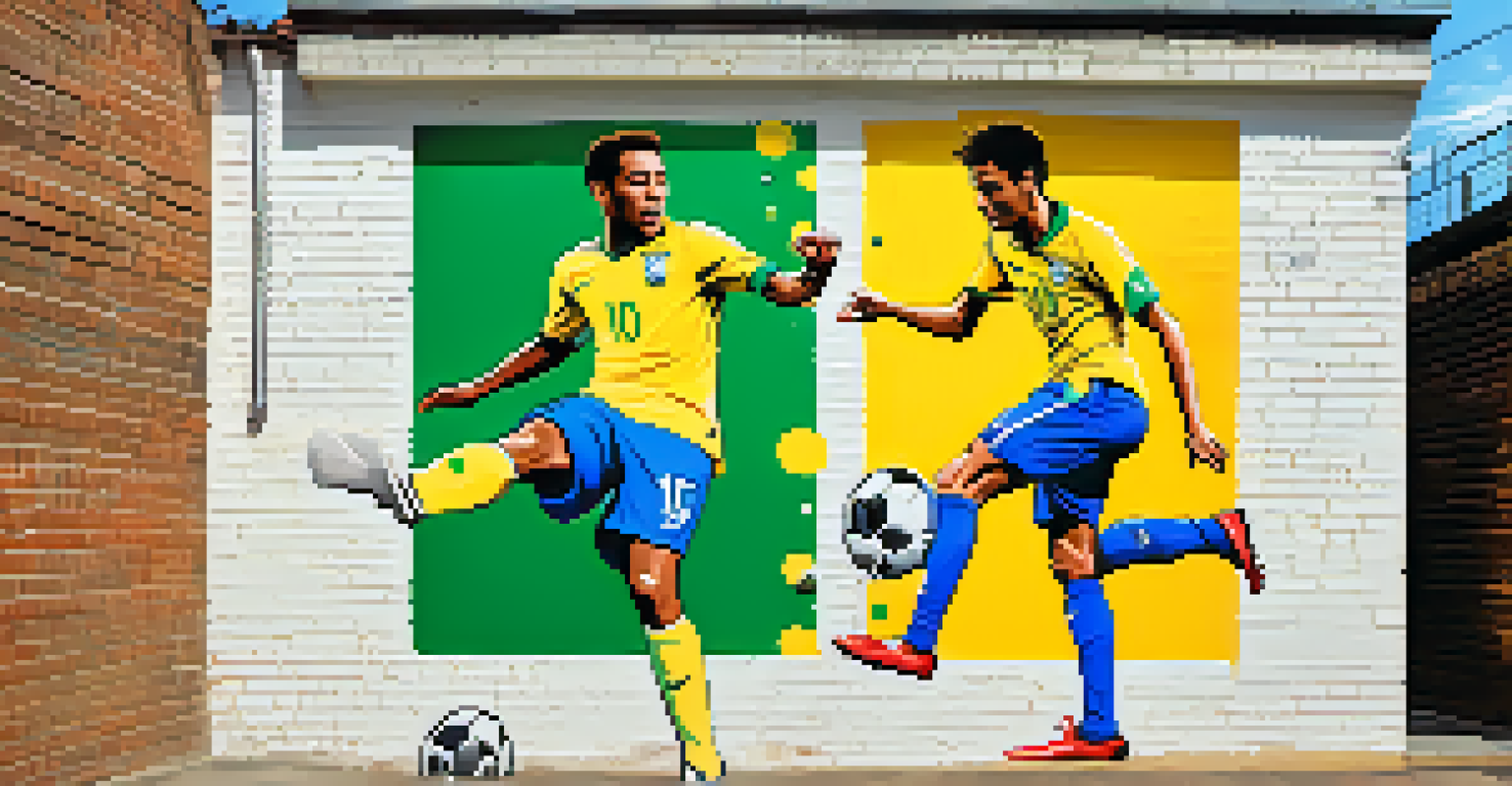The Rise of Football in Brazil: A Cultural Phenomenon Explained

The Origins of Football in Brazil: A Brief History
Football was introduced to Brazil in the late 19th century, primarily by British immigrants. These newcomers brought with them not just the sport, but also a sense of camaraderie that would soon thrive in Brazilian society. The first recorded match took place in 1894, and it wasn’t long before locals began to embrace the game as their own.
Football is a game of mistakes. Whoever makes the fewest mistakes wins.
By the early 20th century, football clubs were sprouting up across the country, reflecting the diverse cultural tapestry of Brazil. Cities like Rio de Janeiro and São Paulo became hotbeds of football activity, with teams forming based on neighborhood ties and social connections. This grassroots development helped plant the seeds for a national passion that would grow exponentially.
As the sport gained popularity, Brazil began to develop its unique style of play, characterized by flair, rhythm, and creativity. This distinctive approach not only set Brazilian football apart but also made it a source of national pride, uniting people from different backgrounds in a shared love for the game.
Football as a National Identity: Uniting a Diverse Nation
In a country as diverse as Brazil, football has become a powerful tool for unity. Regardless of socioeconomic differences, people from all walks of life come together to support their favorite teams and players. This common ground fosters a sense of belonging, making football a significant part of the Brazilian identity.

During major tournaments, such as the World Cup, the entire nation comes alive with a palpable excitement. Streets are filled with vibrant colors, music, and celebrations, showcasing the collective passion for football. This shared experience transcends language and cultural barriers, creating a unique bond among Brazilians.
Football Unites Brazil's Diversity
Football transcends socioeconomic differences, fostering a sense of belonging and national pride among Brazilians.
Moreover, Brazilian football legends like Pelé and Zico have become cultural icons, symbolizing hope and aspiration for many. Their achievements on the field inspire generations, reinforcing the idea that football is not just a game but a vital component of Brazil’s cultural fabric.
The Role of Football in Brazilian Society and Economy
Football in Brazil isn't just a sport; it’s a significant part of the economy. With millions of fans supporting local clubs, the football industry generates substantial revenue through ticket sales, merchandise, and broadcasting rights. This economic impact extends beyond the stadiums, affecting local businesses and creating jobs.
The ball is round, the game lasts ninety minutes, and everything else is just theory.
Additionally, football serves as a platform for social change. Various grassroots initiatives leverage the sport to promote education, health, and community development. Programs like 'Soccer for Social Change' aim to uplift underprivileged communities, showcasing how football can be a catalyst for positive transformation.
The sport also provides a pathway for young talent to rise from humble beginnings to national fame. Many players begin their journey in the favelas, where playing football becomes a means of escape and opportunity. This narrative of hope and perseverance resonates deeply within Brazilian culture.
The Cultural Impact of Brazilian Football: Music and Art
Brazilian football has significantly influenced the country’s music and art scenes. The rhythms of samba often echo the beats of a football match, with songs celebrating victories and players becoming anthems for fans. This musical fusion creates an electric atmosphere that enhances the sporting experience.
Artists and musicians frequently draw inspiration from football, creating pieces that reflect the passion and excitement surrounding the game. Street art murals of famous players can be seen in cities across Brazil, showcasing the cultural significance of football in everyday life. These artistic expressions not only honor the sport but also contribute to the vibrant cultural landscape of Brazil.
Cultural Impact of Football
Brazilian football significantly influences music and art, creating a vibrant cultural landscape that celebrates the sport.
Moreover, football-related events often feature live music and performances, further intertwining the sport with Brazil’s rich artistic traditions. This synergy between football, music, and art fosters a sense of community and celebration, making each match an occasion for cultural expression.
The Evolution of Brazilian Football: From Pelé to Neymar
The evolution of football in Brazil is marked by iconic players who have left a lasting legacy. Pelé, often regarded as the greatest footballer of all time, brought international attention to Brazilian football in the 20th century. His extraordinary skills and charisma paved the way for future generations.
Fast forward to the 21st century, and Neymar has emerged as the face of Brazilian football. His dazzling footwork and flair on the pitch captivate audiences worldwide, continuing the tradition of Brazilian players who possess a unique style. Neymar’s success also highlights the global reach of Brazilian football, attracting fans far beyond the country’s borders.
This transition from Pelé to Neymar illustrates not just a change in players but also the evolution of the game itself. As football continues to grow in popularity and influence, new talents will emerge, each adding their own chapter to the rich narrative of Brazilian football.
Challenges Facing Brazilian Football: Corruption and Management
Despite its rich history and cultural significance, Brazilian football faces significant challenges, particularly regarding corruption and management issues. Scandals involving bribery and mismanagement have tarnished the sport's reputation, leading to distrust among fans and stakeholders. These issues highlight the need for reform and transparency within the football governing bodies.
Moreover, the financial struggles of many clubs have led to a decline in competitiveness, affecting the overall quality of the game. Smaller teams often struggle to keep up with wealthier clubs, creating an imbalance that undermines the spirit of competition. This disparity poses a threat to the development of young talent, who may not have access to the resources needed to thrive.
Challenges in Brazilian Football
Corruption and management issues threaten the integrity of Brazilian football, highlighting the need for reform and support from fans.
Addressing these challenges requires a concerted effort from all stakeholders, including clubs, players, and fans. By advocating for change and supporting initiatives aimed at restoring integrity to the sport, Brazilians can ensure that football continues to be a source of national pride and unity.
The Future of Brazilian Football: Innovation and Growth
Looking ahead, the future of Brazilian football is ripe with possibilities for innovation and growth. The integration of technology, such as video analysis and performance tracking, is already transforming how the game is played and managed. These advancements can enhance player development and overall team performance, keeping Brazilian football competitive on the global stage.
Furthermore, the rise of social media has allowed fans to engage with the sport in new and exciting ways. From live updates to behind-the-scenes content, platforms like Instagram and Twitter enable a deeper connection between players and supporters. This dynamic interaction fosters a sense of community and keeps fans invested in the sport.

Ultimately, as Brazilian football adapts to modern challenges and opportunities, it will continue to evolve while maintaining its core values of passion and unity. The love for the game remains unwavering, ensuring that football will always be an integral part of Brazil's cultural identity.